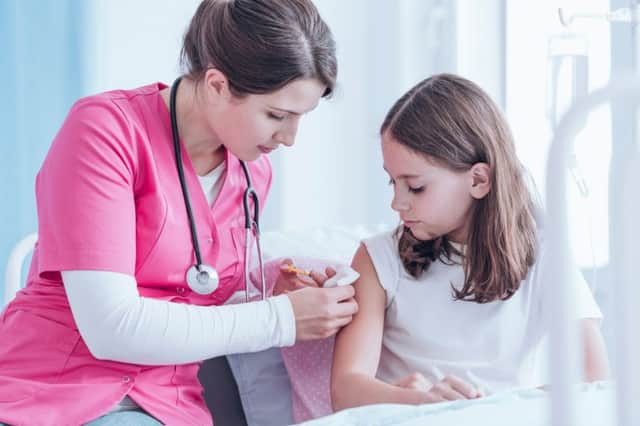GPs raise concerns over drop in immunisation rates


MMR and flu injections traditionally given at local doctors’ surgeries are to become the responsibility of clinics set up by health boards. The move is designed to reduce the workload of GPs.
But some doctors argue that in rural areas people might miss visits due to longer journeys to attend the clinics.
Advertisement
Hide AdAdvertisement
Hide AdNHS Highland said the vaccine transformation programme was a national three-year initiative and it was at the early stages of implementing the government policy in its area. The health board added it would be making sure it did not do anything that increased risks to the population.
Dr Philip Wilson, a GP and professor of rural health care, is opposed to the change.
He said the new clinics would be shared by different practices and there was a potential risk of some patients missing a clinic visit. “There is a particular issue about remote communities getting occasional visits,” he said.
“There are no powers for GPs picking up people opportunistically and increasing immunisation rates. There will be an immunisation clinic shared between several different practices, and the consequence of that is that even when patients want to have their immunisation and are able to turn up for the appointments, they might have to travel huge distances to get there. That, in turn, is going to remove the incentive or make it more difficult for people to actually get immunisations.”
Dr Wilson added: “It makes sense to carry on paying GPs to provide immunisations in rural areas.”
Adam Strachura, of Age Scotland, said if the aim of the new set up was get more people inoculated then “that was a good thing”.
But he added that for many older people their GP was key to their overall health and wellbeing.
He said: “Their regular GP is an important part of their health care needs. A GP will be able to look at all their medical issues, as well as administrating injections like the flu vaccination.”
Advertisement
Hide AdAdvertisement
Hide AdLaura Hamlet and her family live in Achiltibuie in Wester Ross. The community, 80 miles north-west of Inverness, is 24 miles from the nearest village, Ullapool.
She said: “My youngest son is a winter baby, he was born in November, and winter babies tend to pick up lots of coughs and colds, so we had three goes at getting his immunisations.”
The mother-of-two said that having to travel longer distances to reach a clinic would be more expensive.
Andrew Buist, Chair of Scottish GP Committee said: “It is vital that people across Scotland, no matter where they live, have easy access to immunisation services. That must of course be at the centre of all planning as we look to implement the GP contract – which is aiming to secure a more sustainable future for primary care and GP services.
“Introducing new ways of delivering vaccinations is one way to support practices and GPs who face excessive, inappropriate and unmanageable workloads, while at the same time making sure people are able to access vaccinations conveniently and effectively.
“For those practices who don’t face that issue with workload, or who have particular circumstances, such as their remote rural location, then the contract allows them to go on delivering vaccinations. There is absolutely no obligation to opt into this, or any detriment for not doing so. The contract already addresses this specifically by allowing for the development of locally agreed contract options where it is not possible to deliver the Vaccination Transformation Programme.
“Suggesting that this will be implemented in a one size fits all approach, that adversely forces inappropriate solutions on rural areas is simply wrong. We have always been clear that in remote rural areas, we are conscious we need to respond in a pragmatic and flexible way that works for practices and their local populations, and the very specific challenges they face.”
He added that he expects vaccination services in Scotland to ‘adapt’ to changing population needs.
